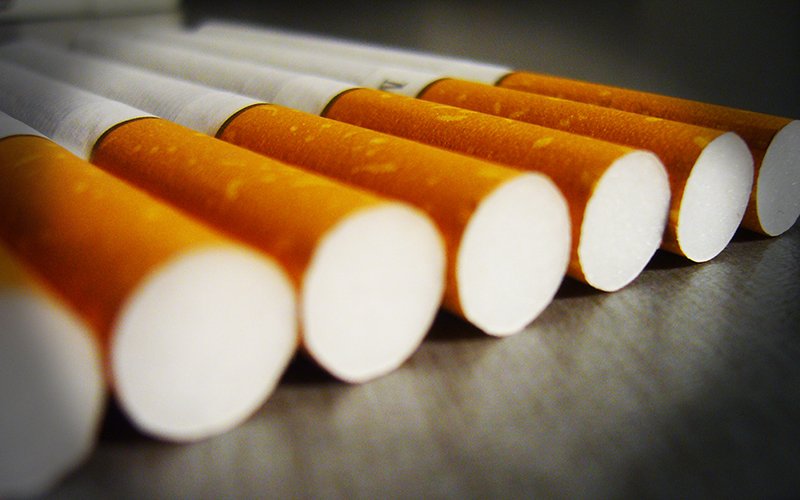PHOENIX – From the beginning of the COVID-19 pandemic, health experts have pointed to smoking as one of several risk factors that could worsen the disease and potentially lead to death.
Now an analysis of available research shows just how dangerous tobacco use might be during COVID-19 – nearly doubling the risk of disease progression in smokers and former smokers.
The research, coupled with fresh warnings from global health experts about correlations between smoking and the novel coronavirus that causes the disease, runs counter to a much-publicized French study that claims smoking might somehow protect individuals against infection.
“Smoking significantly worsens COVID-19,” said Stanton Glantz, professor of medicine and director of the Center for Tobacco Control Research and Education at the University of California, San Francisco.
Cigarette smoking is the leading cause of preventable disease and death in the United States, according to the Centers for Disease Control and Prevention. And though smoking has declined in past years, in 2018 nearly 14 of every 100 U.S. adults – about 34 million people – smoked cigarettes.
Native Americans have the highest rates of smoking in the nation and have been hit hard by COVID-19, a highly infectious disease that primarily attacks the lungs but also other organs.
Smoking any kind of tobacco reduces lung capacity and increases the risk of many respiratory infections, according to the World Health Organization. Impaired lung function makes it harder for the body to fight off respiratory diseases like COVID-19.
The University of California analysis examined 19 peer-reviewed studies involving 11,590 COVID-19 patients in China, Korea and the United States. Most of the studies were based on hospitalized individuals, although two studies included some treated on an outpatient basis.
Among the 731 patients with a history of smoking, 218 – or 29.8% – experienced disease progression, compared with 17.6% of nonsmoking patients. The review found that when the disease worsened, current or former smokers had more acute or critical conditions, or died.
As president of the Campaign for Tobacco-Free Kids, Matthew Myers has fought for more than 20 years to reduce tobacco use. Since the COVID-19 outbreak, Myers said his organization has been studying data from countries that demonstrate a clear link between smoking and increased risk of the disease.
“The data from China, Italy, the UK and the United States all indicates that individuals who smoke are at a greater risk for suffering the more severe consequences of COVID,” Myers said. “So it’s not a surprise that the most recent data out of the CDC identified smoking as an independent risk factor for the increased likelihood that an individual who contracts COVID will be hospitalized.”
Myers said there are no studies to date around electronic cigarettes and COVID-19 but noted that vaping can harm the lungs and weaken the immune system, and “we know that individuals who have weakened lungs and weakened immune systems are at greater risk from COVID.”
“There is often a discussion about, ‘Are e-cigarettes safer than cigarettes?’ It’s the wrong comparison,” he said. “We know that e-cigarettes do harm the lungs, do compromise your immune system. And what’s worse: In the United States, the majority of new users of e-cigarettes over the last four years are kids.”
Glantz also noted that it’s not yet known whether vaping can help lead to infection from COVID-19, but emerging evidence suggests that exposure to aerosols from e-cigarettes harms the cells of the lung and diminishes the ability to respond to infection.
“Smoking and e-cigarettes will damage the upper airway and decrease pulmonary immune function in general,” he said.
Lesli Vipond, a program manager at the Respiratory Health Association, said she would not recommend the use of e-cigarettes as a way to protect the lungs during COVID-19. The association, based in Chicago, works to prevent lung disease and promote clean air.
“We do encourage people to use one of the FDA-approved patient medications which do not include nicotine,” Vipond said, adding, “Quitting smoking is one of the best things that you can do for your health, and that’s especially true when it comes to COVID-19.”

A recent analysis of available research shows just how dangerous tobacco use might be during COVID-19 – nearly doubling the risk of disease progression in smokers and former smokers. (Photo by Silvia Sala/Creative Commons)
In a scientific brief released in late June, the WHO noted that there are currently no peer-reviewed studies examining links between smoking and the initial onset of COVID-19 or directly estimating the risk of hospitalization among smokers.
However, 27 observational studies found that smokers constituted 1.4% to 18.5% of hospitalized adults.
Like the UCSF analysis, the WHO’s examination found a statistically significant association between smoking and the severity of outcomes in patients already diagnosed with COVID-19.
Researchers continue to call for more studies related to secondhand smoke and the coronavirus, as well as risks from e-cigarettes.
Some researchers have taken an entirely opposite viewpoint on smoking and COVID-19, arguing that current data on the number of smokers who’ve been hospitalized with the disease does not support any argument that smoking is a risk factor for hospitalization.
One study in particular, which was conducted in France, has drawn fire for concluding that “active smokers may be protected against symptomatic” COVID-19. The study found that out of 343 hospitalized patients, 4.4% reported being daily smokers, and among 139 patients receiving outpatient treatment, the rate of daily smokers was 5.3%. That’s compared with an overall rate of 25.4% of daily smokers in the general French population.
Myers and Glantz blasted the research as a hypothesis based on inappropriate methods.
“It’s worse than a hypothesis,” Myers said. “It is bad science, and the best available science produces the exact opposite result.”
The WHO has recommended that smokers concerned about COVID-19 quit.
“Quitting,” it said, “will help your lungs and heart to work better from the moment you stop. … Quitting will help to protect your loved ones, especially children, from exposure to secondhand smoke.”


